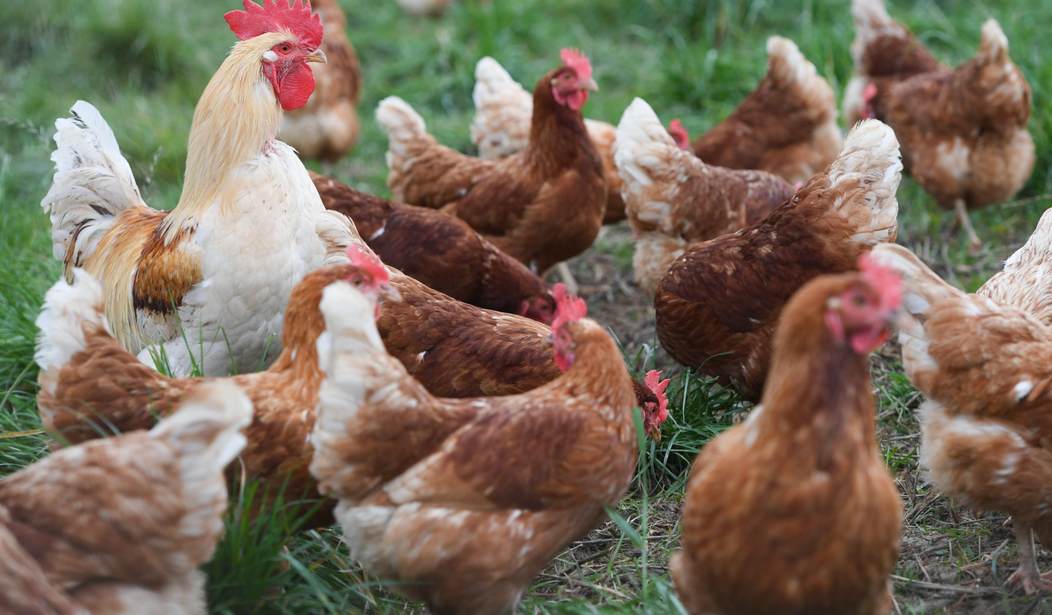California’s calves, pigs, and egg-laying hens are no doubt happier today than they were before voters approved Proposition 2 a decade ago. But are they happy enough? Like the TV show “Portlandia” asked, what kind of a life did Colin the chicken have before he became dinner?
Proposition 2, approved by California voters in 2008, created a new state statute intended to prevent farmers from confining their animals in a manner that stopped them from turning around, lying down, standing up or fully extended their limbs. Proposition 2 marked the first time voters in any state also approved the elimination of keeping chickens in battery cages.
Ten years later, Proposition 12 is on California’s November ballot: a request that voters approve minimum space requirements for calves raised for veal, breeding pigs, and egg-laying hens. The sale of veal from calves, pork from breeding pigs, and eggs from hens confined to areas below the minimum-space requirements would be banned.
PETA and the Humane Society both backed Proposition 2 in 2008. But the animal-rights groups are at odds over Proposition 12.
“Caging animals in small spaces where they can barely move is cruel and inhumane,” said Josh Balk, a vice president with the Humane Society. “Voters will never accept the idea of keeping animals in cages.”
Even though Proposition 12 would guarantee all California laying hens go cage-free in four years, Ben Williamson, a spokesman for People for the Ethical Treatment of Animals, told the Los Angeles Times Proposition 12 is a “weak measure” that doesn’t go far enough.
“It keeps hens in cages until 2022 and then leaves them in cramped warehouses with one square foot of space thereafter. We think we can do more and we should do more,” Williamson said.
Williamson also contended Proposition 12 would “waste time, resources and a real opportunity to improve conditions for hens,” instead of “simply re-enforcing the egg industry’s own requirement.”
Balk described Proposition 12 as the “most far-reaching law for farm animals of all time,” and accused PETA of being out of step with mainstream California.
PETA is not an outlier in the debate. The Humane Farming Association doesn’t like Proposition 12, either. The HFA, like PETA, supported the Humane Society and Proposition 2 10 years ago. Bradley Miller, president of the Humane Farming Association, said his group, and the Humane Society, “had a falling out” over Proposition 12.
The egg industry doesn’t like it either. Instead of keeping hens happier, The National Association of Egg Farmers, in a statement to USA Today, warned Proposition 12 would create “less humane” conditions, because without cages, hens would only peck at and hurt each other, while at the same time easily spreading disease.
The Association of Egg Farmers also contended Proposition 12 would “remove consumer choice” by forcing people to purchase eggs from cage-free hens, which would be more expensive than conventionally produced eggs.
A California Legislative Analyst’s Office study said consumers would pay more if the electorate approves the proposal Nov. 6. The reason for the increase is twofold: First, farmers would have to remodel or build new housing for their animals to provide the space mandated by the proposal. Much of those costs, the analysis stated, would have to be passed on to consumers.
Second, the measure would also make it illegal for businesses in California to knowingly sell uncooked pork or veal, or eggs, from farmers — inside or outside the state — that didn’t have animal housing that met the measure’s requirements.
As a result, the LAO report said it would take several years for enough farmers in California and other states to change their animal housing systems to meet Proposition 12’s requirements. That would adversely affect the supply of veal, pork and eggs. Without a change in demand, that would translate to higher retail prices.
However, the LAO report also states that because many corporate farms were already moving toward cage-free housing and other changes to give animals more room to move around, some price increase would happen anyway until farmers were able to meet demand.
But Steve Greenhut sees a bigger problem with Proposition 12. Forget about abusing the animals. Think about abusing the ballot box. Greenhut, an Orange County Register columnist, opines as he wonders about the wisdom of asking voters who probably “can’t name any of their representatives, let alone explain how the state’s finances work,” to decide “complex regulatory matters that might take hours of analysis to cast an informed vote.”
“Perhaps the best – but not only – example of this foolishness on the Nov. 6 ballot is Proposition 12,” Greenhut wrote.
“There need to be limited regulations that reduce animal cruelty, but which don’t impede the ability of farmers to provide affordable and healthy food. Does this new initiative advance that idea? I’m as confused about it as ever,” Greenhut admitted, “but I am certain that measures such as this should be resolved in the Legislature and not at the ballot box.”









Join the conversation as a VIP Member